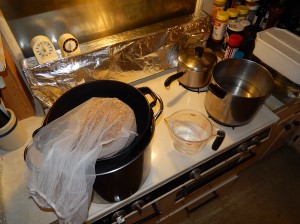 Previously, I posted an article listing 5 tips for extract brewers. Believe it or not, there are other pieces of advice that may help extract brewers, and here are five more of them.
Previously, I posted an article listing 5 tips for extract brewers. Believe it or not, there are other pieces of advice that may help extract brewers, and here are five more of them.
1. Evaluate your malt extract by checking its color.
As with any food product made from grains, malt extract will go stale over time. Using stale extract will result in stale-tasting beer. One quick way (aside from smelling and tasting the extract) to check it’s freshness is to make a small amount of wort by dissolving the extract to a density of 11–12 °Plato (specific gravity 1.044–1.048). If you’re using pale or light malt extract, the color should be pale or golden. If it’s amber (or darker), the extract is stale.
2. Know the key differences between dried and liquid malt extract.
Liquid malt extract is wort from which water has been removed. Dried malt extract is wort that has been condensed (as with liquid malt extract), and then dried to a powder. More water is removed from dried malt extract than from liquid. As such, when you reconstitute wort from them both, the dried malt extract wort is slightly darker. (This is because it was heated slightly more to remove the last bit of water.) However, because it contains more water, liquid malt extract goes stale faster. If you are making a very light-colored beer in the next couple weeks, your best bet is to get some extremely fresh liquid malt extract. If you buying malt extract in bulk, and plan to store it and use it over a few months, dried extract is a better choice.
3. Boil your wort vigorously.
 Extract brewers should boil as much wort as possible, up to a full-wort boil. However, on many stoves, larger volumes cannot be brought to more than a simmer. In that case, you either need to boil less volume, or do something to increase the heat being applied to your wort. A very simple thing you can do is to put the lid loosely on your brewpot. This will trap a small amount of heat and increase the vigor of your boil.
Extract brewers should boil as much wort as possible, up to a full-wort boil. However, on many stoves, larger volumes cannot be brought to more than a simmer. In that case, you either need to boil less volume, or do something to increase the heat being applied to your wort. A very simple thing you can do is to put the lid loosely on your brewpot. This will trap a small amount of heat and increase the vigor of your boil.
Some homebrewers will advise against this, arguing that you’ll trap DMS in your brewpot and your beer will taste like cooked corn. DMS is produced when the wort from an all-grain beer is heated and is mostly driven off in the boil. Brewery grade malt extract has already been boiled (and condensed and maybe dried), so there is less DMS to worry about. If you’re boiling wort from a partial mash, leave the lid off as long as you can smell cooked corn. If you can’t (and the boil is just simmering), loosely cover the brewpot with your lid.
Always leave the lid on loosely, so steam can escape; don’t cover the boil completely.
4. Cooling and the dilution water.
When I first started brewing, I had the idea that I didn’t need to cool my wort that much, because the water I used to dilute the wort would bring the temperature down. I found out quickly that that wasn’t the case, even when I tried it again with water I had refrigerated overnight. Your just-boiled wort holds a lot of heat. You really need to cool it down before diluting it with water and pitching your yeast. Don’t rely on the dilution water have a big effect (because it won’t) and don’t pitch your yeast until you are sure the wort is cool enough not to shock them.
5. Carbon filter your water.
One nice thing about extract brewing is that you don’t need to worry much about the mineral content of your water. All-grain brewers do because what’s dissolved in their water will affect their mash pH. Given that the malt extract manufacturer has mashed the grains, you don’t have that to worry about.
However, you do need to address the chlorine compounds in your water. If you use municipal tap water, it is likely treated with chloramines for sanitation. If these compounds survive the boil (and they will) and end up in your beer, it will result in off flavors. If you have an under the sink carbon water filter, this should take care of the problem. If not, crush half a Campden tablet and stir it into your water before brewing, assuming you’re treating 10 gallons (38 L) or less.
—-
Related articles
Handling Sugar Additions in the Kettle
Water Treatment for Extract Brewers
Why Partial Mash? (Steeping vs. Mashing)

Thanks for the information
I read out this blog post really useful information. Thanks for share.